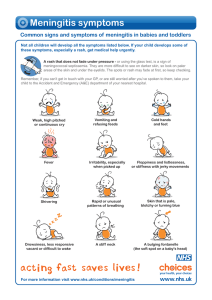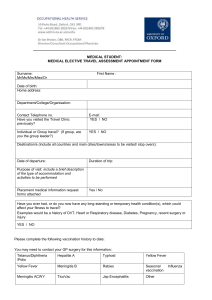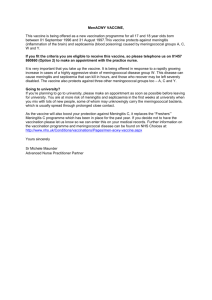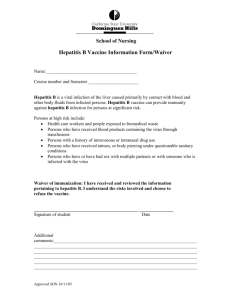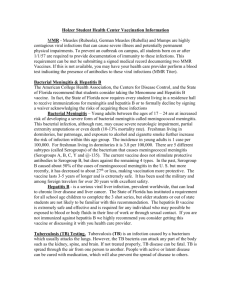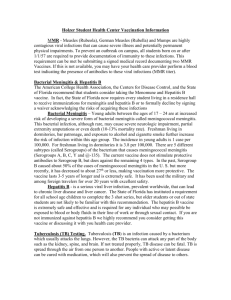Meningococcal Meningitis/Hepatitis B Response Form
advertisement
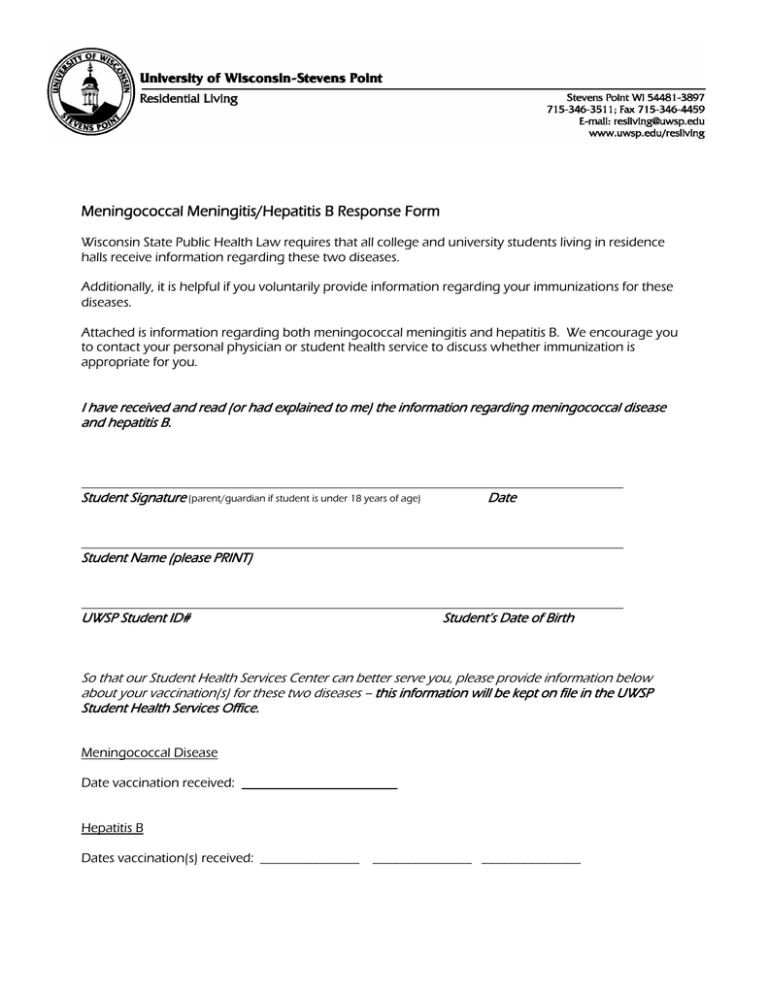
Meningococcal Meningitis/Hepatitis B Response Form Wisconsin State Public Health Law requires that all college and university students living in residence halls receive information regarding these two diseases. Additionally, it is helpful if you voluntarily provide information regarding your immunizations for these diseases. Attached is information regarding both meningococcal meningitis and hepatitis B. We encourage you to contact your personal physician or student health service to discuss whether immunization is appropriate for you. I have received and read (or had explained to me) the information regarding meningococcal disease and hepatitis B. Student Signature (parent/guardian if student is under 18 years of age) Date Student Name (please PRINT) UWSP Student ID# Student’s Date of Birth So that our Student Health Services Center can better serve you, please provide information below about your vaccination(s) for these two diseases – this information will be kept on file in the UWSP Student Health Services Office. Meningococcal Disease Date vaccination received: Hepatitis B Dates vaccination(s) received: _______________ _______________ _______________ MENINGITIS What is meningitis? Meningitis is an infection of the fluid of a person’s spinal cord and the fluid that surrounds the brain. People sometimes refer to it as spinal meningitis. Meningitis is usually caused by a viral or bacterial infection. Knowing whether meningitis is caused by a virus or bacterium is important because the severity of the illness and the treatment differ. Viral meningitis is generally less severe and resolves without specific treatment, while bacterial meningitis can be quite severe and may result in brain damage, hearing loss, or learning disability. For bacterial meningitis, it is also important to know which type of bacteria is causing the meningitis because antibiotics can prevent some types from spreading and infecting other people. Before the 1990s, Haemophilus influenzae type b (Hib) was the leading cause of bacterial meningitis, but new vaccines being given to all children as part of their routine immunizations have reduced the occurrence of invasive disease due to H. influenzae. Today, Streptococcus pneumoniae and Neisseria meningitis are the leading causes of bacterial meningitis. What are the signs and symptoms of meningitis? High fever, headache, and stiff neck are common symptoms of meningitis in anyone over the age of 2 years. These symptoms can develop over several hours, or they may take 1 to 2 days. Other symptoms may include nausea, vomiting, discomfort looking into bright lights, confusion, and sleepiness. In newborns and small infants, the classic symptoms of fever, headache, and neck stiffness may be absent or difficult to detect, and the infant may only appear slow or inactive, or be irritable, having vomiting, or be feeding poorly. As the disease progresses, patients of any age may have seizures. How is meningitis diagnosed? Early diagnosis and treatment are very important. If symptoms occur, the patient should see a doctor immediately. The diagnosis is usually made by growing bacteria from a sample of spinal fluid. The spinal fluid is obtained by performing a spinal tap, in which a needle is inserted into an area in the lower back where fluid in the spinal canal is readily accessible. Identification of the type of bacteria responsible is important for selection of correct antibiotics. Can meningitis be treated? Bacterial meningitis can be treated with a number of effective antibiotics. It is important, however, that treatment be started early in the course of the disease. Appropriate antibiotic treatment of most common types of bacterial meningitis should reduce the risk of dying from meningitis to below 15%, although the risk is higher among the elderly. Is meningitis contagious? Yes, some forms of bacterial meningitis are contagious. The bacteria are spread through the exchange of respiratory and throat secretions (e.g., coughing, kissing). Fortunately, none of the bacteria that cause meningitis are as contagious as things like the common cold or the flu, and they are not spread by casual contact or by simply breathing the air where a person with meningitis has been. However, sometimes the bacteria that cause meningitis have spread to other people who have had close or prolonged contact with a patient with meningitis caused by Neisseria meningitides (also called meningococcal meningitis) or Hib. People in the same household or day-care center, or anyone with direct contact with a patient’s oral secretions (such as a boyfriend or girlfriend) would be considered at increased risk of acquiring the infection. People who qualify as close contacts of a person with meningitis caused by N. meningitides should receive antibiotics to prevent them from getting the disease. Antibiotics for contacts of a person with Hib meningitis disease are no longer recommended if all contacts 4 years of age or younger are fully vaccinated against Hib disease (see below). Are there vaccines against meningitis? Yes, there are vaccines against Hib and against some strains of N. meningitides and many types of Streptococcus pneumoniae. The vaccines against Hib are very safe and highly effective. There is also a vaccine that protects against four strains of N. meningitides, but it is not routinely used in the United States. The vaccine against N. meningitides is sometimes used to control outbreaks of some types of meningococcal meningitis in the United States. Meningitis cases should be reported to state or local health departments to assure follow-up of close contacts and recognize outbreaks. College freshmen, especially those who live in residence halls are at higher risk for meningococcal disease and should be educated about the availability of a safe and effective vaccine which can decrease their risk. Although large epidemics of meningococcal meningitis do not occur in the U.S., some countries experience large, periodic epidemics. Overseas travelers should check to see if meningococcal vaccine is recommended for their destination. Travelers should receive the vaccine at least 1 week before departure, if possible. Information on areas for which meningococcal vaccine is recommended can be obtained by calling the Centers for Disease Control and Prevention at (404) 3324565. There are vaccines to prevent meningitis due to S. pneumoniae (Also called pneumococcal meningitis) which can also prevent other forms of infection due to S. pneumoniae. The pneumococcal polysaccharide vaccine is recommended for all persons over 65 years of age and younger persons at least 2 years old with certain chronic medical problems. There is a newly licensed vaccine (pneumococcal conjugate vaccine) that appears to be effective in infants for the prevention of pneumococcal infections and is routinely recommended for all children greater than 2 years of age. This information is from the CDC’s website; additional information may also be found there: http://www.cdc.gov/ncidod/dbmd/diseaseinfo/meningococcal_g.htm HEPATITIS B Who is at risk for hepatitis B? In 2001, an estimated 78,000 persons in the U.S. were infected with HBV. People of all ages get hepatitis B and about 5,000 die per year of sickness caused by HBV. How great is your risk for hepatitis B? One out of 20 people in the U.S. will get infected with HBV some time during their lives. Your risk is higher if you Have sex with someone infected with HBV Have sex with more than one partner Shoot drugs Are a man and have sex with a man Live in the same house with someone who has lifelong HBV infection Have a job that involves contact with human blood Are a patient or work in a home for the developmentally disabled Have hemophilia Travel to areas where hepatitis B is common Your risk is also higher if your parents were born in Southeast Asia, Africa, the Amazon basin in South America, the Pacific Islands, and the Middle East. If you are at risk for HBV infection, ask your health care provider about hepatitis B vaccine. How do you get hepatitis B? You get hepatitis B by direct contact with the blood or body fluids of an infected person; for example, you can become infected by having sex or sharing needles with an infected person. A baby can get hepatitis B from an infected mother during childbirth. Hepatitis B is not spread through food or water or by casual contact. What does the term “hepatitis B carrier” mean? Hepatitis B carriers are people who have chronic (long-term) infection with HBV and never recover fully from the infection; they carry the virus and can infect others for the rest of their lives. In the U.S., about one million people carry HBV. How do you know if you have hepatitis B? You may have hepatitis B (and be spreading the disease) and not know it; sometimes a person with HBV infection has no symptoms at all. Only a blood test can tell for sure. If you have symptoms Your eyes or skin may turn yellow You may lose your appetite You may have nausea, vomiting, fever, stomach or joint pain You may feel extremely tired and not be able to work for weeks or months Is there a cure for hepatitis B? There are medications available to treat long-lasting (chronic) HBV infection. These work for some people, but there is no cure for hepatitis B when you first get it. That is why prevention is so important. Hepatitis B vaccine is the best protection against HBV. Three doses are commonly needed for complete protection. If you are pregnant, should you worry about hepatitis B? If you have HBV in your blood, you can give hepatitis B to your baby. Babies who get HBV at birth may have the virus for the rest of their lives, can spread the disease, and can get cirrhosis of the liver or liver cancer. All pregnant women should be tested for HBV early in their pregnancy. If the blood test is positive, the baby should receive vaccine along with another shot, hepatitis B immune globulin (called HBIG) at birth. The second dose of vaccine should be given at 1-2months of age and the third dose at 6 months of age. Who should get vaccinated? All babies, at birth All children 0-18 years of age who have not been vaccinated Persons of any age whose behavior puts them at high risk for HBV infection Persons whose jobs expose them to human blood This information is from the CDC’s website; additional information may also be found there: http://www.cdc.gov/ncidod/diseases/hepatitis/b/faqb.htm
